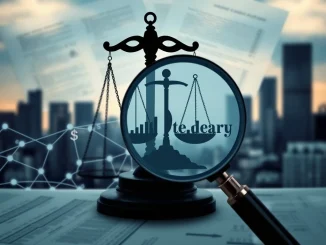
Are you navigating the exciting world of cryptocurrency investments? It’s a thrilling space, brimming with potential, but recent warnings from the U.S. Securities and Exchange Commission (SEC) are casting a shadow of doubt over just how safe your investments truly are. SEC Commissioner Caroline Crenshaw has sounded the alarm, highlighting a critical issue that every retail crypto investor needs to understand: a significant lack of basic safeguards in the crypto market. Let’s dive into what this means for you and your digital assets.
Why is Crypto Investor Protection a Growing Concern?
In a recent Crypto Task Force roundtable, Commissioner Crenshaw didn’t mince words. She expressed serious concerns about the absence of regulatory oversight for many crypto platforms. Unlike traditional financial markets, where stringent rules are in place to protect investors, the crypto landscape often operates in a regulatory gray area. This lack of clarity creates a breeding ground for risks that many retail investors might not fully grasp.
Think of it like this: Imagine investing your hard-earned money in a stock market that has no rules, no referees, and no guarantees. Sounds risky, right? That’s essentially the picture Crenshaw is painting of the current crypto market for many retail participants.
Decoding the Risks: What Kind of Crypto Market Risk Are We Talking About?
Crenshaw pointed out a concerning trend: many crypto platforms are bundling together crucial financial services – brokerage, custody, and clearing – all under one roof. In traditional finance, these functions are typically separated to prevent conflicts of interest and ensure checks and balances.
Here’s a breakdown of why this bundling is problematic and increases crypto market risk:
- Conflict of Interest: When one entity acts as broker, custodian, and clearinghouse, it can create situations where the platform’s interests might clash with the investor’s best interests. For example, a platform might prioritize its own profits over ensuring the best execution prices for your trades.
- Lack of Transparency: Without regulatory oversight, these bundled services often operate with less transparency. It becomes harder to track how your assets are being handled and whether fair practices are being followed.
- Operational Risks: Consolidating these functions within a single, unregulated entity can amplify operational risks. If the platform faces technical issues, security breaches, or even goes bankrupt, the impact on investors can be severe and complex to resolve.
Essentially, the absence of separate, regulated entities for these core financial functions increases the overall crypto market risk and leaves retail investors in a more vulnerable position.
Are Retail Crypto Investors Aware of the Lack of Safeguards?
This is a crucial question. Crenshaw highlighted a significant disconnect between investor expectations and the reality of retail crypto investor protection. Many newcomers to the crypto space might assume that their digital assets are protected in ways similar to traditional investments. However, this is often not the case.
Let’s break down some key areas where investor expectations might not align with reality:
- Asset Custody: Do you truly understand who holds your cryptocurrency? When you use a crypto platform, you might believe you have direct control over your assets. However, in many cases, the platform acts as the custodian. If the platform is hacked or experiences issues, your assets could be at risk. Unlike traditional brokerage accounts, crypto custody often lacks the same level of regulatory oversight and insurance.
- Bankruptcy Protections: What happens to your crypto if a platform goes bankrupt? In traditional finance, there are established procedures and legal frameworks to protect investors in such situations. However, the legal landscape for crypto bankruptcies is still evolving and often unclear. It’s not guaranteed that you would recover your assets in a crypto platform bankruptcy.
- Insurance Coverage: Are your crypto holdings insured against theft or loss? While some platforms offer insurance, it’s crucial to understand the terms and limitations. Insurance coverage in the crypto space is not as standardized or comprehensive as in traditional finance, and it may not cover all types of losses.
This gap between expectation and reality underscores the urgent need for better retail crypto investor protection and clearer communication about the inherent risks involved in crypto investing.
What Steps Are Needed to Enhance Crypto Safeguards?
Crenshaw’s message isn’t just about highlighting problems; it’s also a call to action. She emphasized the need for:
- Greater Regulatory Clarity: Clear and consistent regulations are essential to establish a level playing field and provide investors with a better understanding of the rules of the game. This clarity would help legitimize the crypto market and foster greater trust.
- Stakeholder Collaboration: Addressing the challenges in the crypto space requires collaboration between regulators, industry participants, and investors themselves. Open dialogue and cooperation are crucial to developing effective solutions that balance innovation with investor protection.
Essentially, the path forward involves creating a regulatory framework that is fit for purpose for the unique characteristics of the crypto market, while prioritizing the safety and security of retail crypto investors.
The Bottom Line: Is Your Crypto Safe?
Commissioner Crenshaw’s warning serves as a critical reminder: the crypto market, while offering exciting opportunities, is not without significant risks. The current lack of robust SEC regulation crypto and investor safeguards means that retail investors are particularly vulnerable.
As a crypto investor, what can you do?
- Educate Yourself: Understand the risks involved in crypto investing. Don’t assume your crypto is protected in the same way as traditional investments.
- Choose Platforms Wisely: Research the platforms you use. Look for platforms that prioritize security and transparency, and are engaging with regulatory frameworks.
- Advocate for Regulation: Support initiatives that promote sensible regulation of the crypto market to enhance investor protection.
The message is clear: the crypto world needs to mature, and a crucial part of that maturation is establishing robust investor protections. Until then, it’s vital for retail investors to be aware, be cautious, and demand greater crypto safeguards for their digital assets. The future of crypto depends on building trust, and trust is built on security and protection.



